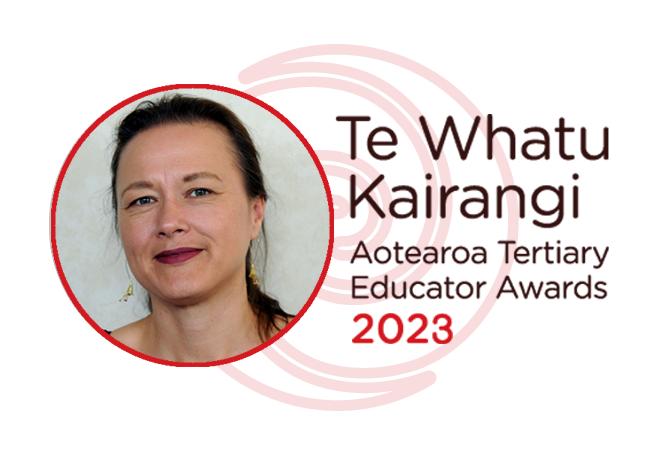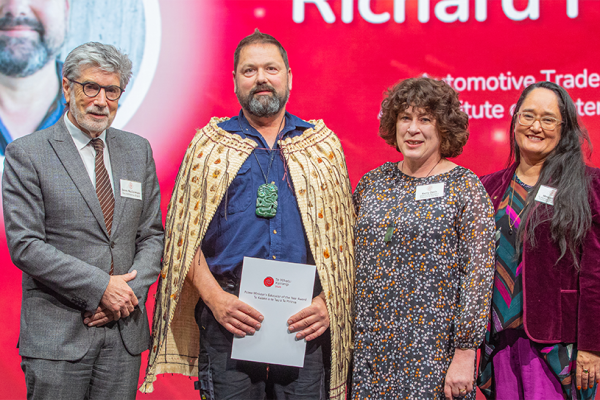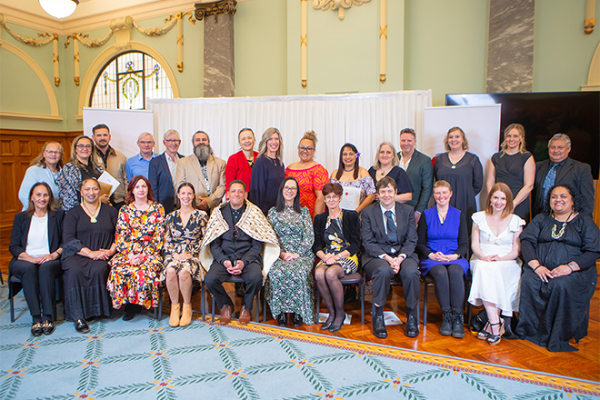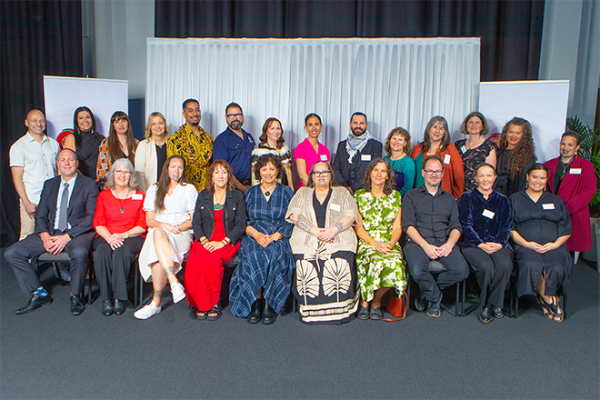Melanie Wall
Relationships key for this innovative leader
Category Winner | Innovation in learning, teaching and curriculum
Senior Tutor in Te Kura Mātai Taiao | School of Environment | Waipapa Taumata Rau | The University of Auckland
Watch Melanie Wall's Teaching profile video
Melanie is a tertiary educator with over 20 years of experience, lecturing at the Universities of Edinburgh and Hull, and then the University of Auckland from 2005. She was born in Taupō and has Ngāti Tūwharetoa whakapapa and Pākehā ancestry.
Melanie’s geography subject expertise empowers students to think critically and challenge the status quo, often engaging with controversial issues. She draws on the critical pedagogy of bell hooks to inform her approach to relational learning, which seeks to teach to transgress. In commenting about her teaching, Melanie noted:
“In teaching geopolitics, contested histories, and geographies of exclusion, issues such as nationalism, race, gender and class can enter the classroom. But the good thing about controversial topics is that students have skin in the game in terms of their experiences, identities, and cultures, so they tend to be much more engaged in their learning.”
Many of the techniques encouraging student interaction can be risky when teaching controversial issues. Safety is a key challenge. One of the TES priorities is “ensuring that places of learning are safe and inclusive and free from racism”. The problem is that when the teaching is about racism, the classroom cannot be free from it. hooks’ approach instead proposes that safety is not the absence of conflict but rather overcoming the barrier of knowing how to cope in situations of risk.
In 2010, when active learning techniques in Melanie’s lectures led to a back-row student altercation (albeit quickly diffused), she shied away from these, fearing a reoccurrence. Five years later, after significant critical reflection and research, Melanie re-engaged with active learning techniques to teach controversial topics. The physical altercation outlined earlier emphasises the critical importance of the relational component of active learning, especially when engaging with controversial topics. Not only was there no pre-existing relationship between the two students which could have enabled a different outcome, the large class setting made it impossible for the lecturer to be aware of potential issues.
In 2017, Melanie transformed her teaching approach to create a learning community through team-based learning (TBL), where learners enact controversial topics. She recognised that relational active techniques which are business-as-usual in the tertiary learning environment, are challenging in large classes. Her revised approach contends that the nature of the relationship is critical for the success of active learning when engaging with controversial topics. Embedded in her revised approach to relational learning are the indigenous “Four R’s”: respecting students for who they are, being relevant to their world views, ensuring reciprocity in relationships, and helping students exercise responsibility for their learning.
Relational active learning in two third year courses was confined to small group teaching settings, mediating the risk. Tutorial streams are capped at 25 to enhance the relationship between staff and students, with 4-6 students working in the same team all semester. Each week’s tutorials have structured activities designed to enhance relationality, cumulatively building to the submission of a shared script; performance of their roleplay; peer review of their team members; and an individual critical reflection on the process.
Role-playing privilege in racialised contexts or enacting racialised discourses in a simulated newscast was the culmination of five weeks’ work in each course. Narrative pedagogies are employed through ‘storying’, where students are encouraged to draw on their own experiences and identities. A layer of protection is added though, with students encouraged to perform a role which is different from what they would ordinarily inhabit. A staff peer review of TBL on the Cronulla riots newscast noted:
“What was most revealing as an observer was the depth of the students’ learning. By embedding themselves in the aftermath of the riots, students were able to clearly link their experience to the theory.” (Lecturer, Colleague)
One of the ongoing obstacles to the success of her approach has been overcoming student resistance based on previous TBL experiences. Key changes emerging from the TBL co-design included: addressing the perceived negative grade effect, additional workload, regular peer review to address “freeloading”, assigning team membership, creating clear guidelines if any team issues arose, and providing timetabled space to complete out-of-class teamwork.
In terms of scale, Melanie has taught over 90 courses since 2005, reaching over 12,000 students. A key summative impact indicator are her SET results which have remained consistently high at an average of 97.6% agreeing that she is an effective teacher. Whilst she shares academic scepticism about SET results as a measure of success, she is pleased to maintain this average despite the shift to TBL.
The impact of TBL was also measured through formative feedback. Averaged results from anonymous surveys carried out between 2017-2019 reveal that when students initially receive the roleplay details, 86% are anxious about performing the roleplay. As evidence of impact, students are also surveyed five weeks later, after their roleplays, with 94.3% agreeing the roleplay was helpful for their learning and 95% declaring they would like to do further roleplays.
“This type of pedagogy necessitates students to reflect on their own values and beliefs, which can make them vulnerable. The success of the exercise was the result of Mel’s careful planning to establish a safe space for the students.” (Associate Professor)
Leadership in innovating learning, teaching and curriculum at the school, faculty and university level were also recognised by this award. Melanie has sought to foster a culture of teaching excellence within her School. In 2018, she created the Ako Innovation Committee (AIC) which promotes, enhances and supports research‐informed teaching and learning excellence, collaboration and innovation. The AIC encourages innovative research‐informed ako through improving existing practices or engaging in different or new pedagogical approaches, technologies, curricular enhancement, course design and organisation, and assessments.
Melanie has also led transformational initiatives to decolonise and indigenise ako. She is deeply involved in projects partnering with other Māori staff to enhance teaching of Te Ao Māori and indigenous knowledge. She is also a committed member of Te Taura Here Pūtaiao, a Māori leadership rōpū in the Faculty of Science. She is the co-lead of Te Ako Pūtaiao pou, which seeks to enrich curricula and pedagogies to enhance Māori learner success and staff experience.
“For a Māori student, the University of Auckland can be an alienating space…What helped to change this for me was Mel, through what she taught and how she taught.” (Student)
At a university level, she is currently co-leading the creation of a compulsory first year course from 2025, as part of the university’s Curriculum Framework Transformation (CFT). The course is an ambitious endeavour to make Te Tiriti o Waitangi and knowledge of place foundational for all students. Her co-leadership has provided a unique opportunity to draw on her expertise in teaching controversial topics and creating meaningful change for learners at scale, with relational learning core to the learning design. In commenting about Melanie’s co-leadership of the course, the Pro Vice Chancellor Māori noted: “I cannot overstate how crucial Mel’s institutional, pedagogical and curriculum expertise has been for the University.”
In recognition of her impact and practice both within and beyond the classroom, she was awarded the 2019 Faculty of Science Dean’s Award for Teaching Excellence, the 2022 University of Auckland Sustained Excellence in Teaching Award, and she became a Senior Fellow of the Higher Education Academy in 2020.



